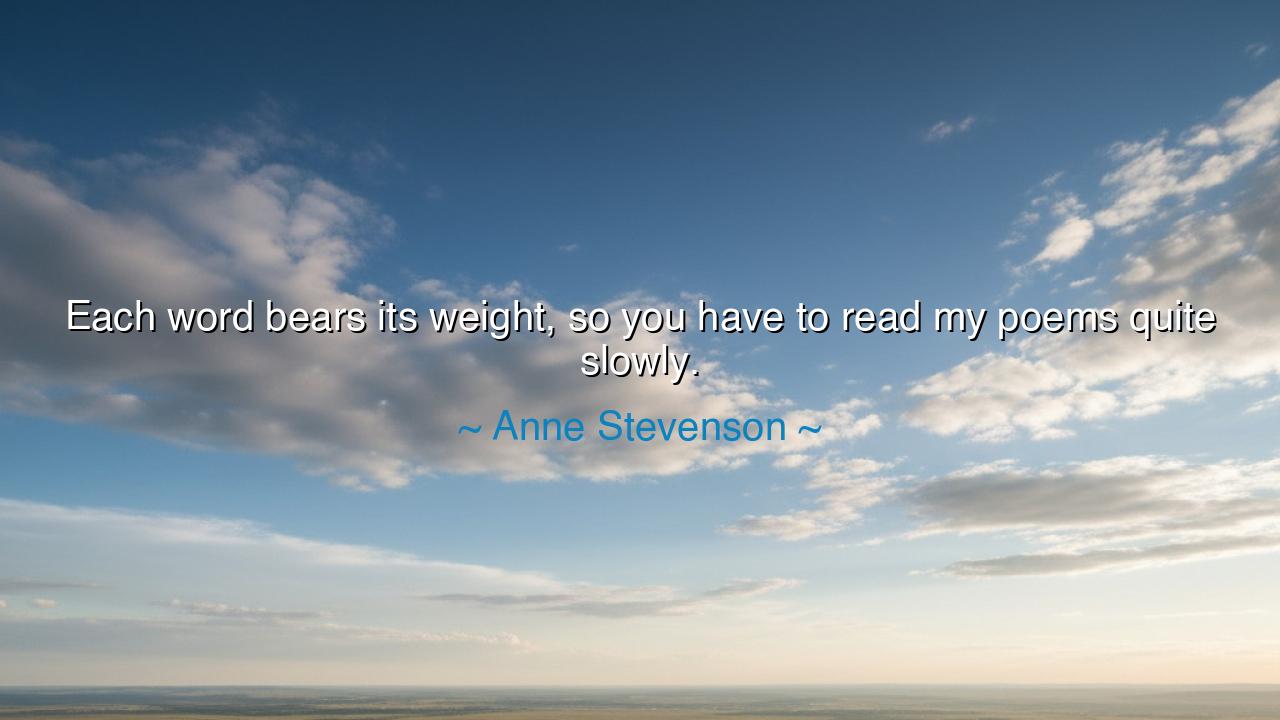
Each word bears its weight, so you have to read my poems quite






Hear the solemn counsel of Anne Stevenson, whose craft was honed upon truth and clarity: “Each word bears its weight, so you have to read my poems quite slowly.” In this utterance, she speaks not only of her own verses but of the very nature of language itself. Words are not feathers drifting without burden; they are stones, each carrying its own gravity, each shaping the balance of thought and feeling. To read too quickly is to trample upon meaning, but to read with care is to uncover hidden depths, as one who bends low to find jewels in the dust.
The wisdom of this saying rests on the ancient recognition that words are power. A single word can heal or wound, can spark war or preserve peace, can stir the heart to love or to despair. The poet, more than any other, knows this, and so she sets her words with precision, weighing each syllable as though upon a scale. Stevenson reminds us that when words are chosen with such care, they are not meant to be consumed hastily, but savored like bread in a famine, like water in the desert.
The ancients themselves revered this truth. The prophets of old, when they spoke, uttered few words, yet their weight has carried across millennia. Think of Heraclitus, whose fragments endure: “You cannot step into the same river twice.” Only a handful of words, yet within them lies a universe. So too with poetry—brevity, when infused with weight, becomes inexhaustible. The words are not many, but their gravity draws us in endlessly. Stevenson, standing in that lineage, bids her readers slow their pace, for to rush is to miss the wealth carried in each syllable.
History gives us vivid examples. Consider the speeches of Abraham Lincoln. His Gettysburg Address contained fewer than three hundred words, yet every word bore immense weight. He did not waste a single one. Read slowly, the speech opens like a flower: it honors the dead, calls the living to purpose, and binds a nation together in memory and resolve. But read too quickly, and the richness of sacrifice and hope slips by unseen. This is what Stevenson warns us against: the loss of meaning through haste.
Yet her words are not only about poetry or oratory, but about life itself. For life, too, is composed of moments that bear weight. Each conversation, each act of kindness or cruelty, each silence—all are words written in the poem of existence. If we rush through our days, we miss their gravity, their lessons, their gifts. To live slowly, to notice, to let each “word” of life strike the heart—this is to live poetically, to read the world as one reads a poem.
The lesson, then, is clear. Do not read lightly, do not live hastily. When you encounter a poem, read as though each word is carrying its own eternity. Pause after a line. Let silence speak between verses. And in your daily life, practice the same: listen carefully to the words of others, weigh your own words before you speak, and do not hurry past the small details, for they too are heavy with meaning.
Therefore, remember Stevenson’s wisdom: each word bears its weight. Treat words as sacred, both in reading and in speaking. Honor their power by moving slowly, by giving them time to unfold their hidden strength. And extend this practice into life itself, where each moment, each encounter, is a word in the greater poem. Read it slowly, live it fully, and you will discover treasures that haste can never reveal.






MTNguyen Minh tri
Stevenson’s idea of reading slowly really speaks to the immersive experience of poetry. If each word carries weight, then it’s almost like the poem becomes a conversation that demands our full attention. How does slowing down allow us to see the layers of meaning behind each word? Does it help us connect with the emotion or story being told in a deeper way?
BNBao Ni
This quote resonates with me because it acknowledges the power of language in a subtle way. The idea that each word ‘bears its weight’ implies that every choice of word in a poem is intentional and significant. If this is true, how often do we overlook the power of single words when reading poetry? What might we discover if we gave every word its due weight and consideration?
HNDo Hong Nhung
Anne Stevenson’s statement about reading poetry slowly makes me think about how often we rush through our lives in general. Are we not giving enough time to the things that matter, like the words in a poem? It suggests that to understand the full depth of a poem, we need to slow down and appreciate the language. Can slowing down our reading habits lead to a deeper understanding of not just poetry, but of life itself?
TBHong Nguyen Thi Bich
Stevenson’s idea that each word in her poem carries weight challenges the way we typically read poetry. How many times have I rushed through a poem, missing subtle nuances because I wasn’t reading slowly enough? What would happen if I truly focused on each word, giving it the space to resonate? Maybe poetry demands more attention than we often give it.
YNTu Yen Nguyen
This quote by Anne Stevenson really emphasizes the importance of patience when reading poetry. It’s as if the poem itself is asking the reader to slow down and reflect. I wonder how often we miss the depth of poems because we’re skimming through them. Does this mean that every word in poetry holds more significance than we initially realize? How does slowing down change the way we engage with a poem?